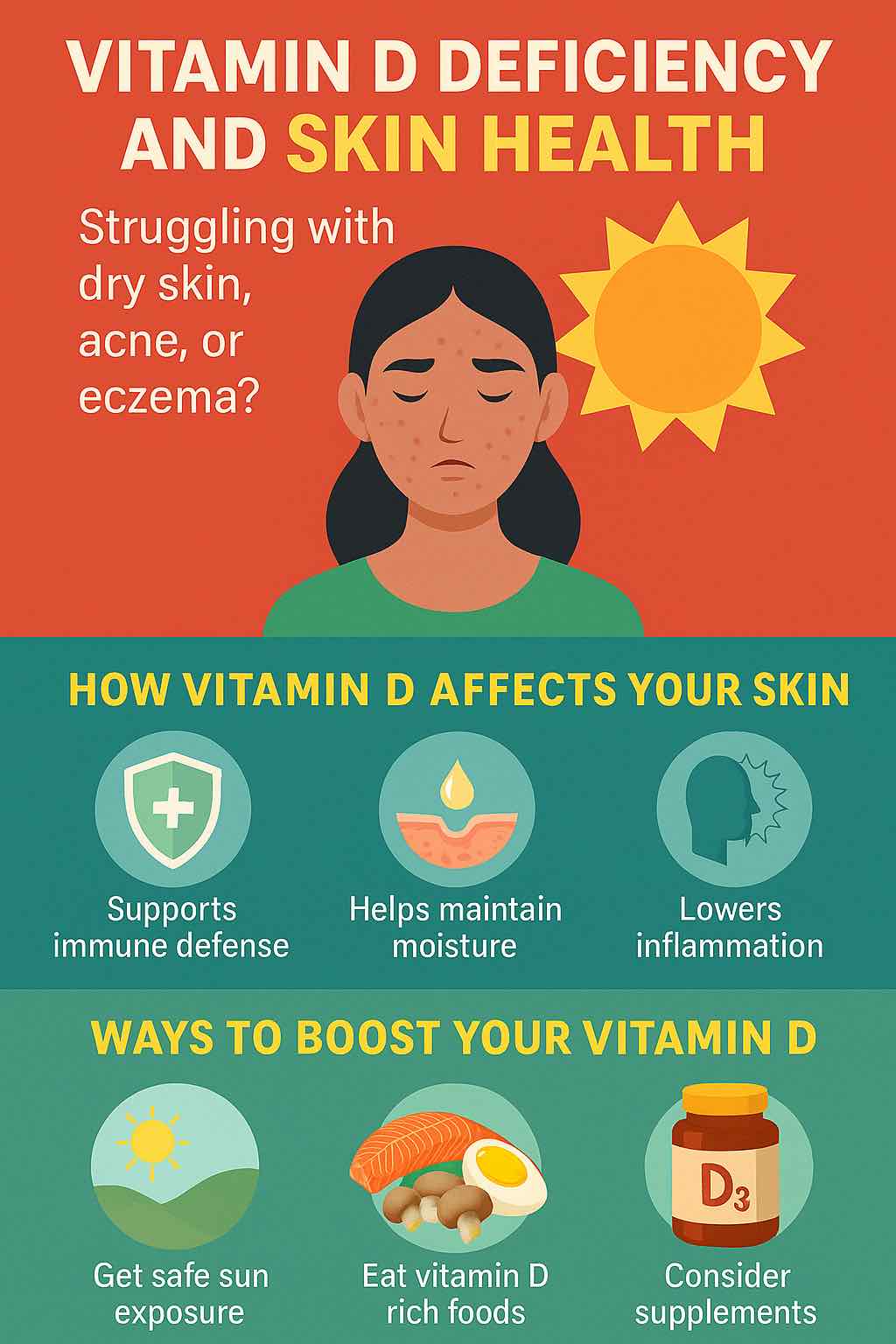
Most of us think of Vitamin D as “the sunshine vitamin” for strong bones — but research in 2024–2025 confirms it’s equally vital for skin health.
Vitamin D acts more like a hormone than a vitamin. Your skin not only helps produce it when exposed to sunlight, but also relies on it to:
- Maintain a healthy skin barrier
- Support immune defenses against infections
- Reduce inflammation in conditions like eczema, psoriasis, and acne
- Aid in wound healing and tissue repair
- Protect against photo-aging from UV damage
Try: Top-Rated Vitamin D Supplements Available on Amazon India
⚠ Skin-Related Signs of Vitamin D Deficiency
Vitamin D deficiency often goes unnoticed until it starts affecting your skin. Look out for:
- Persistent dry, flaky skin
- Slow-healing wounds or scars
- Frequent eczema or psoriasis flare-ups
- More breakouts or stubborn acne
- General dullness in skin tone
- Increased sun sensitivity or burning
For a full list of symptoms — including fatigue, bone aches, and mood swings — see:
14 Signs of Vitamin D Deficiency
🧪 The Latest Research (2024–2025)
Recent studies reveal that maintaining adequate Vitamin D levels can:
- Lower skin inflammation — A 2025 review showed that Vitamin D supplementation reduced flare-ups in psoriasis, acne, vitiligo, and rosacea.
- Improve UV protection — Vitamin D helps repair oxidative damage from sun exposure.
- Enhance skin immunity — It regulates how skin cells grow, differentiate, and defend against pathogens.
- Boost recovery from skin injuries — Deficiency slows wound healing and increases infection risk.
💡 Many dermatologists now recommend Vitamin D testing for patients with chronic skin issues.
🥗 How to Boost Vitamin D for Better Skin
1. Smart Sun Exposure
- Aim for 10–20 minutes of morning sunlight on arms, legs, and face.
- Darker skin may need slightly longer exposure.
- Avoid harsh midday sun to prevent damage.
2. Eat Vitamin D-Rich Foods
Include foods like:
- Fatty fish (salmon, mackerel, sardines)
- Egg yolks
- Fortified milk & plant-based milks
- UV-exposed mushrooms
📌 Full List: Food for Vitamin D
3. Consider Supplementation
If you live in low-sunlight areas, wear sunscreen daily, or have confirmed deficiency, supplements may be the most reliable way to restore healthy levels.
💊 Top Vitamin D Supplements in India (2025)
We reviewed the best-rated Vitamin D₃ + K₂ supplements on Amazon India to help you choose wisely.
| Product | Why We Like It | Link |
|---|---|---|
| Vlado’s Himalayan Organics D₃ + K₂ | Optimal D₃ 600 IU + K₂ MK-7 ratio, vegetarian, great reviews. | Buy Here |
| OSOAA D₃ + K₂ + B₁₂ | Unique triple formula for energy & bone health, vegan. | Buy Here |
| Tata 1mg D₃ + K₂ | Trusted Indian brand, budget-friendly. | Buy Here |
| The Body Reserve D₃ + K₂ | Plant-based, most cost-effective. | Buy Here |
| Pure Nutrition D₃ + K₂ | Strong formula, reputable brand. | Buy Here |
🧠 How to Choose the Right Supplement
- Form: Choose D₃ (cholecalciferol) over D₂.
- Additives: K₂ MK-7 improves calcium use and bone safety.
- Dose: 600–1,000 IU daily is safe for most adults.
- Lifestyle Fit: Check vegetarian/vegan suitability.
- Value: Compare cost per IU and tablets per pack.
📌 Full Buying Guide: Top-Rated Vitamin D Supplements Available on Amazon India
✨ The Bottom Line
Vitamin D deficiency is more than a bone health issue — it’s a skin health disruptor.
If you’re experiencing stubborn skin problems, it may be worth checking your Vitamin D levels and taking a proactive approach through diet, sunlight, and supplements.
Your skin will thank you for it.
FAQs — Vitamin D Deficiency & Skin Health
1. Can Vitamin D deficiency cause skin problems?
Yes. Low Vitamin D levels can weaken the skin barrier, increase inflammation, and slow wound healing, leading to issues like dryness, eczema, psoriasis, acne, and dullness.
2. What skin conditions are linked to Vitamin D deficiency?
Conditions like psoriasis, eczema, vitiligo, acne, and rosacea have been linked to low Vitamin D levels, according to recent studies (2024–2025).
3. How do I know if my skin issues are due to Vitamin D deficiency?
If you have persistent dryness, frequent inflammatory skin flare-ups, slow healing wounds, or dull skin tone along with fatigue or muscle weakness, it’s worth getting your Vitamin D levels tested.
4. Does Vitamin D help with acne?
Yes. Vitamin D’s anti-inflammatory properties can help reduce acne flare-ups and redness, especially when combined with a healthy diet and skincare routine.
5. How does Vitamin D protect the skin from aging?
Vitamin D supports collagen production, helps repair UV-induced damage, and reduces oxidative stress, slowing down photo-aging and fine lines.
6. How much Vitamin D do I need for healthy skin?
Most adults need around 600–1,000 IU per day, but people with deficiency may require higher doses under medical supervision.
7. Can I get enough Vitamin D from sunlight alone?
Possibly, if you have regular exposure to morning sunlight (10–20 minutes daily). But factors like skin tone, sunscreen use, pollution, and indoor lifestyles can limit production.
8. What foods are rich in Vitamin D for skin health?
Fatty fish, egg yolks, fortified milk/plant milk, and UV-exposed mushrooms are good dietary sources.
9. Should I take Vitamin D₂ or D₃ supplements?
Vitamin D₃ (cholecalciferol) is more effective at raising and maintaining blood levels than D₂, and is generally preferred.
10. Do Vitamin D supplements also help hair and nails?
Yes. Adequate Vitamin D supports hair follicle cycling and nail strength by aiding calcium metabolism and reducing inflammation.










[…] Vitamin D Deficiency and Skin Health […]
[…] Do Read: Vitamin D Deficiency and Skin Health. […]
[…] Do read: Vitamin D Deficiency and Skin Health. […]